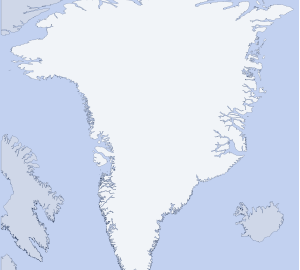Endangered People: Linguist To Document Dying Greenlandic Dialect

Imagine watching the sun go down on October 24, and living in complete darkness straight through to when it finally rises again on the 8th of March. Imagine 40 below temperatures on a regular basis. Imagine subsisting almost entirely on the fatty flesh of sea mammals like seal, walrus, and narwhal – caught by dogsled hunters. Imagine melting snow and ice each day to meet all your water needs; living outside the realm of any cash economy.
Imagine, in other words, living for a year in one of the world’s northernmost communities: an Inuit town of 600 called Quaanaaag.
Professor Stephen Pax Leonard of Cambridge University left on a jet plane yesterday to do just that. His goal is to learn Inuktun, the local dialect (only 1000 people in the entire world speak it), and to write down everything he can about the way the people of Quaanaaag speak, eat, hunt, tell stories, and make their place on earth. How they live.
And there’s an urgency to Leonard’s work, because the Inughuit (meaning “big people”) won’t live that way for much longer. Leonard is taking on this epic journey now, because it’s only a matter of about a decade or so, he says, before the Inughuit will have to move their tiny, isolated, chilly world south, due to climate change.
Leonard told PRI’s The World:
“It’s a community that’s dependent on the hunting of sea mammals. Because of global warming there are fewer animals to kill and it’s increasingly dangerous to do so using these ancient traditional techniques that they use [dogsled and kayak] and so it looks like now this entire community could be moved further south within 10-15 years. And if that happens, the language, culture, the way of life will all go, will all disappear.”
“If their language dies,” says Leonard, “their heritage and identity will die with it.” Leonard has a head start on the communication front; he’ll be able to get by in his new adopted community by speaking Danish, until he gets the hang of Inukun. But he’ll be rushing toward fluency in his first few months, because all of the good stuff – all of the Inughuit’s most important songs, stories, myths, and spiritual beliefs – live in Inuktun.
I have a hard time putting myself in the shoes of the Inughuit. Imagine your entire way of life, your language, and your home gone, in one fell swoop. Hard to compare it, even, to the terrible displacement and loss that comes with sudden natural disasters like Katrina; the Inughuit’s lifestyle is so unlike any lifestyle found anywhere else in the world, that it seems almost no part of it could be replicated further south, in “society.”
Is this the beginning of a long process by which we humans will document the addition of ourselves to the endangered species list?





